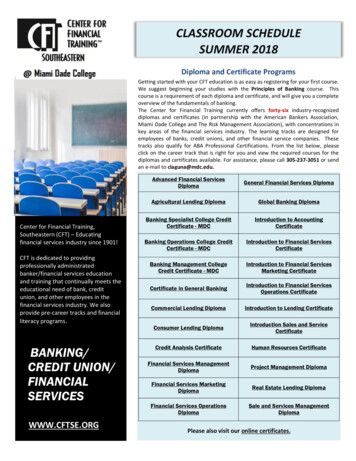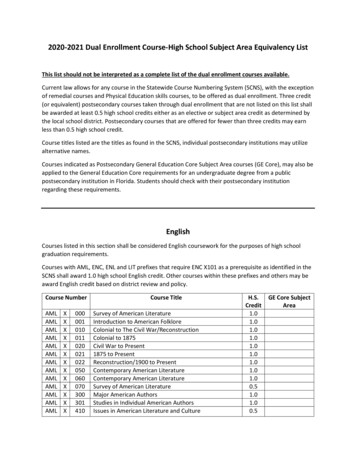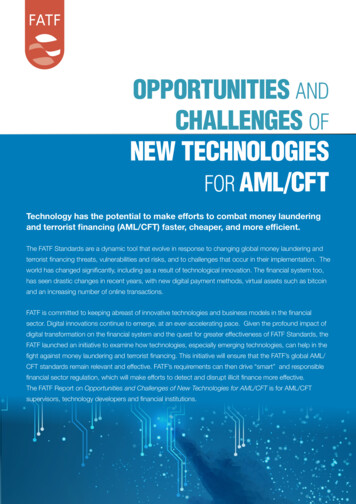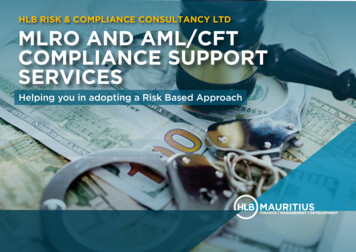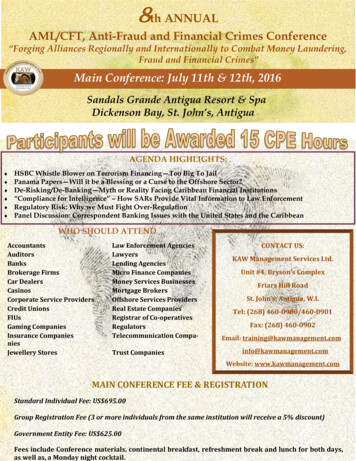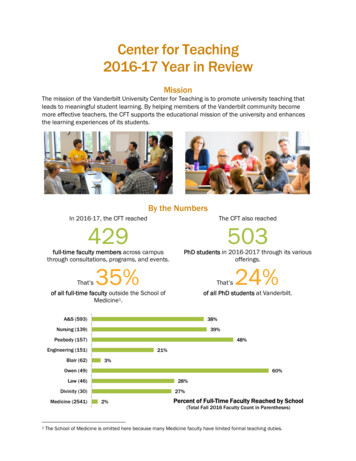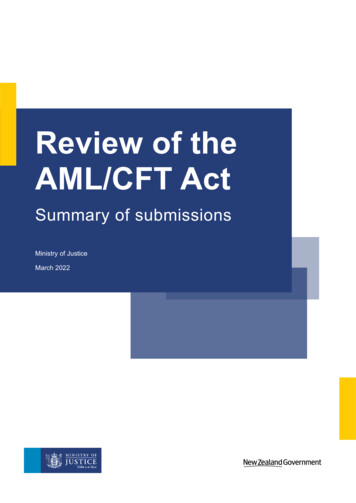
Transcription
Review of theAML/CFT ActSummary of submissionsMinistry of JusticeMarch 2022
Important noticeThe opinions contained in this document are those of the Ministry of Justice and do notreflect official government policy. Readers are advised to seek specific legal advice from aqualified professional person before undertaking any action in reliance on the contents of thispublication. The contents of this discussion document must not be construed as legal advice.The Ministry does not accept any responsibility or liability whatsoever whether in contract,tort, equity or otherwise for any action taken as a result of reading, or reliance placed on theMinistry because of having read, any part, or all, of the information in this discussiondocument or for any error, inadequacy, deficiency, flaw in or omission from the discussiondocument.
ContentsContents. iiGlossary of terms.iIntroduction . iiAbout this document . iiiGeneral comments . 1Cross-cutting topics. 5Supporting the implementation of targeted financial sanctions . 5Virtual Asset Service Providers . 8High Value Dealers . 9Institutional arrangements and stewardship .12Purpose of the AML/CFT Act .12Risk-based approach to regulation.14Mitigating unintended consequences .21The role of the private sector .23Powers and functions of AML/CFT agencies .24Secondary legislation making powers .27Information sharing .31Licensing and registration .32Scope of the AML/CFT Act.35Challenges with existing terminology .35Potential new activities.39Currently exempt sectors or activities .43Potential new regulatory exemptions .45Territorial scope .47Supervision, regulation, and enforcement .49Agency supervision model .49Powers and functions.50Regulating auditors, consultants, and agents.52Offences and penalties .54Preventive measures.57Customer due diligence .57Record keeping.82
Politically exposed persons .83Correspondent banking.88Money or value transfer service providers.88New technologies .90Wire transfers .91Prescribed transaction reports .94Reliance on third parties .97Internal policies, procedures, and controls .101Higher-risk countries .103Suspicious activity reporting.105Other issues or topics.109Cross-border transportation of cash .109Privacy and protection of information .110Harnessing technology to improve regulatory effectiveness .112Harmonisation with Australian regulation .114Ensuring system resilience .115Minor changes .116Definitions and terminology .116Information sharing .116SARS and PTRS .118Exemptions .119Offences and Penalties .120Preventive measures .120
Glossary of termsAML/CFTAnti-money laundering/Countering Financing ofTerrorismActAnti-Money Laundering and Countering Financingof Terrorism Act 2009AML/CFT supervisorsThe Department of Internal Affairs, the FinancialMarkets Authority, and the Reserve Bank of NewZealand, are the entities which regulate reportingentities covered by the AML/CFT ActCDDCustomer Due DiligenceDBGDesignated Business GroupDIAThe Department of Internal AffairsDNFBPsDesignated Non-Financial Businesses andProfessionsFATFFinancial Action Task ForceFIUNew Zealand Police Financial Intelligence UnitFMAThe Financial Markets AuthorityHVDsHigh Value DealersIFTInternational Funds TransferIRInland RevenueMEMutual Evaluation (undertaken by the FATF)ML/TFMoney laundering/terrorist financingPTRPrescribed transaction reportRBNZThe Reserve Bank of New ZealandSARSuspicious activity reportTCSPTrust and Company Service ProviderTFSTargeted financial sanctionsVASPsVirtual Asset Service Providersi
New Zealand’s Anti-Money Laundering and Countering Financing of Terrorism (AML/CFT) Act 2009(the Act) is a core part of our effort to detect and deter money laundering and terrorism financing.Money laundering is the criminal process used to ‘clean’ the money made from crimes such asfraud, dealing in illegal drugs, tax evasion and trafficking. By making the money look like it comesfrom a legitimate source, criminals can cover their tracks and avoid detection. Terrorist financiersalso use similar methods to send money to violent causes and to disguise who is providing andreceiving the money. Criminal organisations and people who finance terrorism target businessesand countries they believe have weak systems and controls they can exploit.Money laundering is happening every day across New Zealand. The Financial Intelligence Unitestimated that over 1 billion a year of dirty money comes from drug dealing and fraud which maybe laundered through New Zealand businesses. The social and economic costs of crimes enabledby money laundering is significantly higher than the value of the laundered proceeds.While the likelihood of terrorism financing in New Zealand is low, the potential consequences aresignificant. AML/CFT tools and information can be invaluable to terrorism investigations althoughfinancing of lone actor terrorists is difficult to detect before an attack. New Zealand has identifiedvulnerabilities to financing of terrorism offshore.Our Act makes it harder for criminals to launder money and provides a significant disincentive tocarrying out the criminal activity in the first place. The Act requires businesses to, among otherthings, check customer’s identification, monitor accounts for suspicious activity, and reportsuspected money laundering and terrorism financing to the New Zealand Police. As a result, the Actwill also make New Zealand less attractive as a destination of international money laundering andoffending and reduce the ability for terrorism to be financed through our businesses. The Act alsohelps ensure New Zealand meets its international obligations by implementing therecommendations of the Financial Action Task Force, which helps maintain New Zealand’s globalreputation.However, these protections come at a significant cost, primarily to the approximately 10,000businesses who have some exposure to money laundering and terrorism financing risks. Thesebusinesses have been required to comply with the AML/CFT regime for a number of years and havefaced an increased cost of doing business and other restrictions with how they can operate. Theregime has also made it harder, if not impossible, for some people and businesses to get access tobasic banking services and participate in the economy.A review commenced on 1 July 2021The Minister of Justice, Hon Kris Faafoi, commenced a review of the AML/CFT Act on 1 July 2021.This review is an opportunity to look back on the past eight years and ask ourselves: have we gotthis right? Does the regime effectively achieve its purposes in the most cost-efficient way? What canwe do better? What can we do without?The review is being led by Te Tāhū o Te Ture, the Ministry of Justice. However, we are supported inthis process by the other government agencies which have roles and responsibilities in theAML/CFT regime, specifically Department of Internal Affairs, Financial Markets Authority, NewZealand Customs Service, New Zealand Police, and Reserve Bank of New Zealand. The MinistryiiOVERVIEWIntroduction
has also established an Industry Advisory Group to provide additional guidance and support as weconduct the review.Our review will be guided by a series of principles, which we will use to inform whatrecommendations we eventually make. These principles are to: create a financial environment which is hostile to serious and organised crime andnational security threats; appropriately and responsibly manage the risks we are exposed to through clearobligations on businesses, agencies, and the public; ensure agencies have proportionate and appropriate powers and functions; facilitate support and enhance domestic and international collaboration and cooperation; adopt international best practices where appropriate to ensure New Zealand fulfils itsinternational obligations and addresses matters of international concern; work in cooperation with industry, public, and Māori and other impacted communities; ensure the AML/CFT regime produces the necessary type and quality of information tosupport other frameworks and to combat money laundering, terrorism financing, andserious and organised crime; ensure that human rights and privacy considerations are addressed and that intrusionson personal rights and freedoms are no more than necessary; and support efficient long-term administration of the regime.Ultimately, we see this review as the start of a conversation about how we can make our AML/CFTregime the best it can be. We want an AML/CFT regime that maintains New Zealand’s status ashaving a high quality and effective regime for combatting money laundering and terrorism financingwithout compromising the ease of doing business or unduly impacting the lives of New Zealanders.We also want to make sure the regime contains sufficient tools to enable flexibility and ensure theregime responds to changing risks and new opportunities for addressing harm.About this documentThis document summarises submissions the Ministry of Justice received from the public and otheragencies. In total, 220 submissions were received following the release of the consultationdocument, and the key points that each submitter made are reflected under the appropriate topic ata high level.Note that the full detail of each submission has not been reflected in this summary, but a copy ofmost of the submissions received is available on the Ministry’s website atwww.justice.govt.nz/amlcft-review. In accordance with submitters’ wishes, we have not publishedany submission that was received in confidence or where the submitter requested that thesubmission not be published.iiiOVERVIEWWe have developed Terms of Reference for the review, which are available here:www.justice.govt.nz/amlcft-review. These terms set out our aspirations for the review, which is thatNew Zealand becomes the hardest place in the world for money laundering, terrorism financing, andfinancing the proliferation of weapons of mass destruction. In doing so, the AML/CFT regime willhelp maintain a safe, trusted, and legitimate economy.
Submissions receivedAnonymous Submission2.MTF Finance Hamilton3.Connect Legal35. Riverlea Finance Limited71. Anonymous Submission4.Select Realty36. Anonymous Submission72. Anonymous Submission5.Zindels Barristers and37. Ausfix Forex Brokers73. Harcourts PinnacleSolicitors34. Harcourts Bay of IslandsRealtyLimited6.Anonymous Submission38. Chrystall Law7.Anonymous Submission39. Professor Michael8.East Asia Transnational9.David HarrisonLittlewood40. Anonymous Submission69. Lynda Smyth70. Simplicity Accounting74. Property Brokers75. Kendons76. Barfoot & ThompsonAuckland City77. Harveys Warkworth10. Deb Koia41. Elevate (2)11. Red Crayon42. Anonymous Submission12. Oak Park Chartered43. Withdrawn Submission79. Ray White Whitianga (1)44. Anonymous Submission80. Anonymous Submission13. Mackenzies Agency45. Bridging Finance81. Ray White Whitianga (2)14. Ray White Rangiora46. Samoa Money Transfer82. Bayleys Hawkes Bay15. Dyson Smythe and47. Clyde Law83. Ray White Tauranga48. Berry & Co84. New Zealand GreenAccountantsGladwell Lawyers16. Glasgow HarleyBarristers and Solicitors17. Polson Higgs18. Omega Commercial19. Laura Williams20. SeniorLAW21. Anonymous Submission22. Anonymous Submission23. Anonymous Submission24. Richardsons25. Anonymous Submission26. Anonymous Submission27. Lex Dean28. Perfect NumbersBookkeeping29. Lyons Asset Brokerage30. Alex Sinton31. Elevate (1)32. Falcon Advances33. Accounting 4 U78. Graeme White &Associates49. Retail CommercialInvestment Finance50. Gulf Accountants(NZGIF)51. Vigilance85. Anonymous Submission52. VPGam86. Richardsons Tairua53. Anonymous Submission87. One Agency54. Anonymous Submission88. Min Sarginson Real55. Kaye Baldock56. Anonymous Submission57. Akahu58. Anonymous Submission59. Freeman Accounting60. Private Box61. Anonymous Submission62. Snowball Effect63. Tommys64. Howard & Co65. Harcourts Gold Star66. LJ Hooker Timaru67. Axis Realty68. ABC BusinessOVERVIEW1.Estate89. Trustees ExecutorsLimited90. Grenadier Real Estate91. Anonymous Submission92. Anonymous Submission93. Lane Neave94. Linfox AramaguardGroup95. Anonymous Submission96. Ray White Whitianga (3)97. Maxima98. FinCap99. FireSuper Schemeiv
133. AG Kosoof & Co166. Anonymous Submission101. NZ Society of134. Confidential Submission167. Anonymous Submission135. Maritime Retirement168. NolansConveyancers102. Law BoxScheme169. Simpson Grierson103. Anonymous Submission136. MATTR170. Anonymous Submission104. AuditsAML137. Medical Assurance171. Deloitte105. Digital Identity NZSociety106. Confidential Submission138. MIA Limited107. Stephens Lawyers139. Milford Asset108. Anonymous Submission109. NZAS Retirement FundTrustee LimitedManagement140. MinterEllisonRuddWatts141. Anton Moiseienko110. Public Trust142. NZ Realtors111. Grey Street Legal143. NZX Clearing112. Westpac NZ Staff144. NZX WealthSuperannuation SchemeTrustee LimitedTechnologies145. Property Brokers113. Anonymous Submission146. PwC114. Anonymous Submission147. Confidential Submission115. 2compli148. REINZ116. Anonymous Submission149. ReMAX117. Carson Fox150. Retirement Villages118. Anonymous SubmissionAssociation172. Cleland Hancox173. Anonymous Submission174. Anonymous Submission175. VCFO Group176. North Law177. Patrick Adamson178. Confidential Submission179. ATAINZ180. Cygnus Law181. MERW Client182. Privacy Commissioner183. Banking Ombudsman184. UniSaver185. Devender Anand186. BitPrime187. Bayleys Mangawhai119. BlockchainNZ151. Richardson Real Estate188. Anonymous Submission120. Agent Commercial152. Risk Robin189. ADLS121. Barfoot and Thompson153. Confidential Submission190. BNZ122. CA ANZ154. Aro Advisors191. British High Commission123. Christian Savings Limited155. SkyCity192. Easy Crypto124. CPA Australia156. LJ Hooker MacKenzie193. FNZ125. Dairy IndustrySuperannuation Scheme126. Harcourts Hoverd & Co127. Financial ServicesCouncilCountry157. Trustee CorporationsAssociation of NZ194. Kiwi Wealth195. NZLS196. RITANZ158. Wealthpoint197. Russell McVeagh159. Westpac198. Securities IndustryAssociation128. Premium Real Estate160. Confidential Submission129. Harcourts Group161. Anonymous Submission199. Unity130. HSBC162. Anonymous Submission200. ASB131. illion163. Miller Johnson201. Institute of Certified New132. Insurance Council of164. Anonymous SubmissionNew Zealand165. Anonymous SubmissionOVERVIEW100. MISS SchemeZealand Bookkeepers(ICNZB)v
202. Financial Advice NZOVERVIEW203. Adyen204. Mainland Capital205. Boutique InvestmentGroup206. Sharesies207. National Council ofWomen NZ208. Dentons KensingtonSwan209. Financial ServicesFederation (FSF)210. TransparencyInternational NZ211. NZBA212. Buddle Findlay213. Compliance Plus214. AML360215. Calibre Partners216. Pacific LawyersAssociation217. Confidential Submission218. Reserve Bank of NewZealand219. Equifax220. Reuben Ottovi
General commentsPART 11.We invited general comments about the regime by asking some overall questions about theAct and how it is performing, specifically: How is the Act operating? Is it achieving its purposes? Are there any areas of risk thatthe Act does not appropriately deal with? What is working and what is not? Are there areas that are particularly challenging orcostly to comply with? How could we alleviate some of those costs while also ensuringthe effectiveness of the system? What could we do to improve the operation of the Act? Is there anything we need to do to “future proof” the Act and ensure it can respond to themodern and largely digital economy?Submitters were generally supportive of the need for the regime and the role itplays2.Most submitters supported the need for and the high-level objectives of the Act. 1 However,some noted that they have not identified any suspicious activities or transactions as a result ofhaving AML/CFT obligations. 2 Only a few submitters thought that the Act fails and will continueto fail in its attempt to detect and deter money laundering, and that the new laws have madeno difference or that the risk has shifted and changed. 3 By contrast, two submitters considerthat the Act results in every person being treated as a criminal by default, which has alienatedsections of the community. 43.Some submitters noted the importance of achieving compliance with FATF recommendations,but also considered that these should not be considered binding nor treated as fully effectiveand appropriate for New Zealand.5 East Asia Transnational considered that AML/CFT lawsshould only exist in certain countries, such as those identified in the Pandora Papers, andconsidered that New Zealand should therefore not need such complex AML laws.However, the regime is far from perfect, with many submitters noting areas forimprovement4.A very common frustration submitters raised is with the amount of duplication that can occur,with some suggesting that a centralising AML/CFT functions such as ID verification couldaddress this issue and provide greater privacy protections with others considering that freeMTF Finance Hamilton, Oak Park Chartered Accountants, Stuart Morris, Perfect Numbers Bookkeeping HarcourtsBay of Islands, LJ Hooker Timaru, Milford Asset Management, BitPrime, Russell McVeagh, Financial Advice NZ,Boutique Investment Group, National Council of Women NZ, FSF12Lyons Asset Brokerage Harcourts Bay of Islands, Snowball Effect, AG Kosoof & Co3Patrick Adamson, Aro Advisors, and submitter 14Perfect Numbers Bookkeeping, AG Kosoof & Co5Maxima, Cygnus Law, Mainland Capital, Boutique Investment Group 1531
access to RealMe or other government databases would achieve this outcome (see furtherPartnering in the fight against financial crime). 6A few submitters felt that some of the requirements regarding CDD, such as asking for thesource of wealth or source of funds, can be overly and unnecessarily intrusive. This reluctancecan be shared by some customers who can be resistant to providing ID for verification,including through secure online channels (see further Privacy and protection of information). 76.ADLS and Dentons Kensington Swan noted that the Act was not sufficiently tailored forDNFBPs and as a result it has been difficult to readily integrate into practice and for manylawyers the burden has been disproportionate both in terms of risk and cost.7.Several submitters criticised the amount and nature of support provided by regulators and theFIU, and that regulators need more resources to properly engage and develop effective andappropriate guidance (see further Agency supervision model). 8 BitPrime noted that traditionallaw-making processes and conventional approaches by regulators have failed to keep up withnew technologies, particularly cryptocurrencies.8.Some submitters have felt frustrated trying to engage with their regulator to understand theircompliance obligations, potentially due to fear of the regulator (see further Balancingprescription with risk-based obligations). 9 In a similar vein, some submitters noted that somereporting entities are focused more on administration and demonstrating compliance ratherthan what the AML legislation is trying to achieve. 109.AG Kosoof & Co and Submitter 106 identified that the lack of plain language is one of themajor difficulties of the legislation, guidelines, and code of practice. This impacts the ability ofcompliance officers to understand what is required and improving accessibility would helpunderstanding and overall compliance (see further Capacity of smaller and larger reportingentities).10.A few submitters were frustrated that no feedback is provided to their business about whethertheir compliance has made a difference, such as money laundering being investigated andprosecuted. 11 Maxima further noted that the FIU not dealing with SARs in a swift timeframe orproviding feedback to reporting entities can generate resentment from businesses which haveobligations, particularly where businesses feel they are being put in a quasi-Police role (seefurther Improving the quality of reports received).11.Laura Williams and Lex Dean queried whether the regime has limited the ability for NewZealanders to receive money from overseas. Other submitters similarly noted that openingaccounts for New Zealand companies owned by offshore persons can be challenging,potentially due to offshore money being treated as high risk. 12East Asia Transnational, Polson Higgs, Harcourts Bay of Islands, LJ Hooker Timaru, AG Kosoof & Co, MilfordAsset Management, REINZ, Patrick Adamson, NZLS, Financial Advice NZ, East Asia Transnational, Lyons AssetBrokerage, VPGam, Akahu, Harveys Warkworth, One Agency, Cygnus Law, Kiwi Wealth, Financial Advice NZ,Vigilance, Snowball Effect, and submitters 106, 18867MTF Finance Hamilton Clyde Law, Harcourts Gold Star, Red Crayon, Polson Higgs, Agent Commercial8Snowball Effect, Risk Robin, Aro Advisors, Kiwi Wealth, NZLS9Polson Higgs, North Law, and submitters 106, 16410Risk Robin, Banking Ombudsman and submitters 106, 15311Falcon Advances, Maxima, AG Kosoof & Co, Risk Robin12East Asia Transnational, Perfect Numbers Bookkeeping and submitter 562PART 15.
The cost of complying is by far the biggest concern submitters raised with theregime13.The biggest area of concern submitters raised is the cost of complying with the regime, withsome considering that the cost-benefit ratio is out of proportion for many businesses and moresignificant for small businesses than originally assumed. 13 Ray White Rangiora estimated that the compliance with the regime has reduced 25%of their profits, with Chrystall Law estimating that customer due diligence has reducedproductivity by 50%. Other businesses estimate their costs to be between 15,000 to 150,000 per annum.14 Lyons Asset Brokerage considered that the cost of complying has meant that sometransactions, particularly those involving trusts, are no longer viable. Grey Street Legaland Submitter 106 noted that the costs of complying with AML/CFT is prohibitive anddisproportionate for small businesses, with North Law noting that the costs of theregime have led to them declining all new clients. A few submitters expressed concerns about the amount of work that needs to be donein order to comply and the amount of time required to understand what is required.15Some submitters note that there appears to be a “one size fits all” approach being takenby the regulators, with little consideration of how the particular business operates or therisks involved (see further Capacity of smaller and larger reporting entities). 16 Other submitters noted that an AML/CFT service industry has emerged, who are able tocharge large amounts of money to support compliance, but for questionable quality orvalue in the support provided. 17 Submitter 106 noted that these providers are often notcost effective for small firms (see further Regulating consultants).In addition to direct financial costs of the regime, several submitters noted the potential for theregime to have indirect impacts on the broader economy and society: some submitters noted that the regime can present a significant barrier to changingfinancial and non-financial providers, which introduces inefficiencies into the market andreduces the potential for competition.18 the National Council for Women New Zealand noted the risk of any additional costsbeing passed onto customers, as this could have a disproportionate impact on women,particularly women living in poverty. Digital Identity NZ and MinterEllisonRuddWattssimilarly noted that the costs associated with CDD may disincentivise services beingprovided to perceived higher risk customers (see further De-risking and financialexclusion).13 East Asia Transnational, Stuart Morris, Dyson Smythe and Gladwell, Polson Higgs, Chrystall Law, Elevate (2Clyde Law, Barfoot & Thompson, Harveys Warkworth, Stephens Lawyers, Grey Street Legal, Agent Commercial,Milford Asset Management, Cygnus Law, ADLS, NZLS, ICNZB, Financial Advice NZ, Sharesies, FSF and submitter18814Linfox Armaguard Group, Patrick Adamson15Red Crayon, Oak Park Chartered Accountants, BitPrime16Stephens Lawyers, AG Kosoof & Co, Milford Asset Management and submitter 10817Red Crayon, Lyons Asset Brokerage Chrystall Law, Clyde Law, LJ Hooker Timaru, AG Kosoof & Co18Polson Higgs, Digital Identity NZ, MinterEllisonRuddWatts3PART 112.
PART 119some submitters considered that the AML/CFT regime has become a barrier tolegitimate offshore investment into the New Zealand economy, as well as the uptake ofgovernment-sponsored initiatives such as “open banking”.19Snowball Effect, Digital Identity NZ, MinterEllisonRuddWatts and submitter 564
Cross-cutting topicsPART 114.The consultation document raised several topics which cut across the chapters we used. Forease of reference, these topics are dealt with holistically here, and include whether and howthe Act should incorporate targeted financial sanctions, and the treatment of Virtual AssetService Providers and High
The Department of Internal Affairs, the Financial Markets Authority, and the Reserve Bank of New . Money laundering is the criminal process used to 'clean' the money made from crimes such as fraud, dealing in illegal drugs , tax evasion and trafficking. . The Minister of Justice, Hon Kris Faafoi , commenced a review of the AML/CFT Act .
